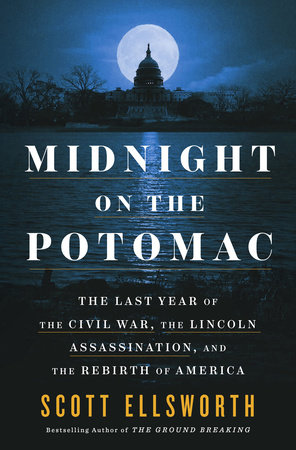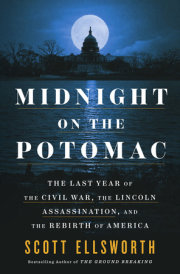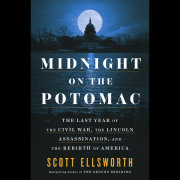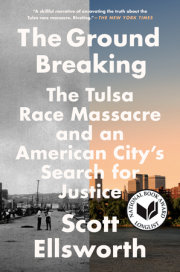-Chapter One-
Something Big
Hardly anyone could understand the boy.
Often clad in his child-sized Union army uniform, complete with shiny brass buttons, epaulets, and a silk sash, his words, such as they were, came out as a flood of toneless syllables, inverted consonants, and dropped vowels. "Dear" became "day," "Crook" was "Took," and "missus" was mumbled as "mith." "He had his own language," recalled one of the bodyguards. Only there was more. Three weeks past his tenth birthday, Tad Lincoln still could not read, write, or dress himself, and he had such a hard time chewing that his food had to be mashed or chopped ahead of time. He was still grieving the loss of his older brother, Willie, to smallpox two years earlier, while his mother, beset with worries that she might lose him as well, had pulled him out of school. As a result, Tad wasn't just the President's youngest son. He was also a deeply lonesome boy growing up in the most famous house in America.
Sensitive and highly emotional, Tad loved the men of the Pennsylvania Bucktails, the infantry regiment assigned to guard the Executive Mansion and the War Department, whom he sometimes drilled on the back lawn or marched through the White House. But he was also more than a little mischievous. Once he harnessed a pair of goats to an upturned wooden chair and, like a miniature Roman charioteer, drove them into the middle of a formal reception being held in the East Room. During cabinet meetings, Tad would burst into the room unannounced, give his father a furious hug, and then dash out again while the exasperated secretary of war, Edwin M. Stanton, the veins in his neck straining at his collar, sputtered on about what an outrage such behavior was. No vase, window, or piece of furniture was safe when Tad was on a tear.
He could also be sweet and kind. Tad often borrowed a few coins from James Halliday, the White House carpenter, to give to a poor man or woman out on Pennsylvania Avenue. Late one afternoon, he invited a gang of street children to share his dinner. The cook, it was said, "tried to shoo them away, but Tad appealed to his father, who said they could stay." He also possessed an uncanny way with animals. There was never a stray dog or cat that he couldn't befriend, while his own personal White House menagerie included a dog named Jip, two cats, a rabbit, a horse, and a turkey named Jack. He also had the two goats, both of which often slept in the same bed with him.
"Mr. Lincoln," recalled Major William Henry Crook, a presidential bodyguard, "kept Tad with him almost constantly." The President would hoist Tad upon his shoulders and gallop through the corridors like a horse or play blind man's buff and other games. When his father was too busy to roughhouse, Tad would get as near to him as he could and play quietly by himself. "I believe he was the best companion Mr. Lincoln ever had," Crook added, "one who always understood him and whom he always understood."
Despite his youth, Tad Lincoln was a keen judge of grown-ups. He could see right through those who paid him compliments or gave him gifts only to gain the good graces of his father. He absolutely despised Secretary Stanton and once doused him with water in the White House garden. And he could tell right off who among his endless stream of tutors were all about boring lessons and even more boring books and those who were game to fly a kite up by the unfinished Washington Monument on a blustery April morning. "For all of his baby tongue," Major Crook recalled, "he had a man's heart and in some things a man's mind." While Tad Lincoln couldn't speak properly or make himself easily understood, he could hear just fine. And what he heard, as the fine spring weather enveloped the city in early 1864, were the sounds of impending change.
For days, there had been hints that something big was in the works.
Stevedores at the Sixth Street Wharf had been unusually busy for weeks, while railroad flatcars loaded with troops had been regularly observed heading south out of Alexandria. In Washington itself, officers and enlisted men had been lining up outside of the city's more than thirty photography studios to have daguerreotypes, ambrotypes, and tintypes taken to be mailed back home. There was even talk among the city's more than five thousand prostitutes about pulling up stakes and heading to City Point, the massive naval port and Union supply depot along the James River in Virginia where the final spring offensive, which everyone knew was soon to commence, would surely be launched.
Then, on April 25, from a balcony above the east entrance to Willard's Hotel, located a block and a half from the White House, President Lincoln reviewed no less than twenty-five thousand Union troops, streaming like a great blue river down Fourteenth Street. "The rank and file were like their comrades on the Rapidan-worn, sunburned, high-spirited boys," as writer Margaret Leech later captured that moment. "Their equipment was light: thin bundles, knapsacks, tin cups, frying pans, guns that shone like silver. Under their grime and sweat, these soldiers looked as hard and handy as mechanic's tools, which have been used, and will be used again." These soldiers were also a far cry from the unsteady, green troops that the Union had first pitched into battle when the war had begun. "Our army had learned to believe that it was sure of ultimate victory," wrote one War Department official. "Rely upon it, the end is near as well."
It certainly had been a long time coming. The last three long and bloody years had seen a near-constant succession of campaigns and battles, complex maneuvers, and unfulfilled promises. Once-obscure towns and place-names, like Bull Run, Chickamauga, Chancellorsville, Antietam, and Gettysburg, were now known by all. And with them had come a revolving cast of generals-Winfield Scott, Ambrose Burnside, George B. McClellan, and George Meade-none of whom had been able to end the war with a resounding Union victory.
Now there was a new one.
He certainly didn’t look the part.
Short in stature and often dressed in a plain, soiled uniform, Ulysses S. Grant fit no one's conception of the ideal military man. He wore dentures, hated military drills, didn't give a whit about style, and cared even less about pomp and ceremony. A middling West Pointer who had spent much of his spare time reading romantic novels in the academy library, he had fought in the Mexican War, was billeted out to Fort Vancouver, Washington Territory, lost his savings in the gambling dens of Portland, and resigned from the army. When the first shots were fired at Fort Sumter, Grant was working as a salesclerk in his father's leather goods store in Galena, Illinois. But fate had different plans. Recommissioned into the Union army, he rose quickly in the ranks and won much-needed victories at Fort Henry and Fort Donelson. He stumbled at Shiloh in 1862, but Lincoln had refused to demote him, noting, "I can't spare this man. He fights."
One year later, Grant had been given perhaps the hardest and most treacherous assignment of the western theater of the war: that of taking Vicksburg, Mississippi. Perched on a high bluff above the Mississippi River and bristling with artillery and well-trained sharpshooters, the Confederate citadel had become a Union graveyard. Wave after wave of blue-clad infantrymen had been cut down on its approaches, while the nearby river bottom was littered with the hulls of sunken Union ships. A renewed frontal assault, Grant reckoned, would produce the same results. So, instead, he countermarched his soldiers hundreds of miles through the Mississippi backcountry, hacking trails through the wilderness, and besieged the city from the rear. Deprived of fresh food and ammunition, Vicksburg fell on July 4, 1863. It was a momentous victory. Within a week, the Mississippi River was completely under Union control, and the Confederacy had been split in two.
Lincoln had found who he was looking for.
Grant arrived in Washington on March 8, 1864, a chilly Tuesday after weeks of dry weather. Early that evening, Grant slipped into the dining room at Willard’s Hotel for a quiet supper, hoping to be just another army officer in a sea of Union blue. But shortly after he had sat down, a rising chorus of whisperings began to wash back and forth across the room. Men and women shifted in their seats, craned their necks, or made some excuse to stand in order to get a better look at the rather diminutive, bearded officer eating alone. Finally, one of the diners couldn’t wait any longer. Standing bolt upright upon his chair in the middle of the dining room, he yelled out, “Three cheers for Lieutenant-General Grant!”
The room erupted into a torrent of cheering and applause, recalled Noah Brooks, the Washington correspondent for the Sacramento Daily Union, "amid a pounding on the tables that which made everything dance." The shouting went on for minutes until, at last, Grant "rose to his feet, awkwardly rubbed his moustache with his napkin, bowed, and resumed his seat and attempted to finish his dinner." But the cat had been let out of the bag. Grant was mobbed by admirers as he attempted to steal out of the front doors of the hotel, and again later that evening, at a reception at the White House. "So great was the crowd, and so wild the rush to get near the general," Brooks wrote, "that he was obliged at last to mount a sofa, where he could be seen, and where he was secure, at least for a time, from the madness of the multitude."
Grant, for his part, wanted none of this. Uncomfortable in the spotlight and a bust at small talk, he slipped out of Washington the next day and headed for Culpeper, Virginia, winter quarters for the Army of the Potomac. Seven and a half weeks later, he departed Culpeper with 120,000 troops, the largest army ever assembled in the Western Hemisphere, and pointed them south.
It was time to break the back of the Confederacy.
It was time to end the war.
-Chapter Two-
The Secret Agent
There were four of them this time.
With him were the two Irish oarsmen and William, his valet, enslaved. It was near dark when they pushed the keelboat from beneath the brushy overhang in the creek, their breaths steaming. The first stars were just coming out, and the April air was thick and cool. When they made it to the river, they left the sail unfurled and, lifting the oars off the burden boards, pushed off from the Virginia shore. The Potomac was nearly three miles wide here, a vast, shimmering plain beneath a darkening sky. Keeping their eyes peeled for the unwelcome appearance of a Union gunboat drifting around the bend, they headed north, accompanied by the dull wash of the muffled oars and the gentle slap of the waves against the hull.
Once they made it to the Maryland side, they hauled the boat into the woods and quickly covered it with leaves and branches. He sent William on ahead to scout for pickets, instructing him to say that he was a runaway if he was detained. William came back within the hour, made his report, and then joined the Irishmen for the return crossing. Then he helped them push off.
He was on his own now.
More than likely, he'd be walking all night. Sticking to the back traces and avoiding, as best he could, farmhouses and stray dogs, with a little luck he'd make it past Mattawoman Creek. Then, sometime before dawn, he'd find a grove of ash or oak, thick with bayberry or holly, and, pulling his hat down over his brow, lay low all day. A second night of walking would take him to Surrattsville. He had friends there. They would bring him brandy, feed him by the fire, and tell him the latest news. In the morning he could borrow or rent a horse. The next night he would be back in Washington. But, for now, he had many miles and a long night ahead.
Of course, if they caught him, he'd hang.
Though he was but twenty-two years old, Thomas Nelson Conrad was already one of the most valuable spies for the Confederate States of America. A former teacher at a private academy in Georgetown, Conrad had planned on murdering Winfield Scott when the war broke out, as the aged commander of the Union army rode in his carriage along Pennsylvania Avenue. But when the new Confederate authorities caught wind of his plan, they nixed it. They weren’t opposed to assassination. It was just that they worried that Scott would be replaced by a younger, more able commander. But Conrad had caught their eye and soon joined the Rebel intelligence network.
He was a good choice. Not only did he know Washington well, but he was inventive, charming, fearless, and determined. Once, during the lunch hour, Conrad slipped inside War Department headquarters and lifted a copy of a Union battle plan off a clerk's desk. Soon he was secretly escorting potential European allies from Washington to Richmond, while in the evenings he loved to visit saloons frequented by Union officers, where he'd pick up clues about the enemy's intentions.
A master of disguise, Conrad frequently altered his facial hair and varied his wardrobe. On some days, he would dress as a preacher, complete with a long black frock coat and a copy of Scripture tucked beneath his arm. On others he might wear an English-cut felt jacket with velvet pants, or the simple wool suit of a farmer on an errand to the big city. Shoes were of particular importance. "The detectives at the capital could tell a Southern-made shoe the moment their trained eyes fell upon it," Conrad later explained. "In fact, they could spot a piece of 'Secesh' foot-gear more quickly than a cavalry-man could a missing horse shoe and, had I retained my late style, arrest would have been a foregone conclusion." Shoes carried with them an additional value as well. With the assistance of a local, pro-Southern cobbler, Conrad's bootheels had been hollowed out in order to hold secret documents and directives from Richmond.
But now, in the early spring of 1864, he would have to be especially careful.
A friend had tipped him off earlier that a description of him was on file at the National Detective Bureau and that federal agents were on the lookout. He'd have to steer clear of Georgetown altogether, as he might be recognized there. And he could probably go out only at night. Too much was at stake.
Copyright © 2025 by Scott Ellsworth. All rights reserved. No part of this excerpt may be reproduced or reprinted without permission in writing from the publisher.







